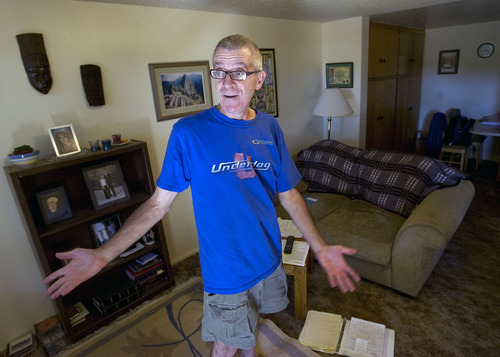This is an archived article that was published on sltrib.com in 2011, and information in the article may be outdated. It is provided only for personal research purposes and may not be reprinted.
The Department of Veterans Affairs is threatening to withhold funding from two Salt Lake City Housing Authority properties, saying poor management is "endangering the health and safety" of veterans.
Complaints by former employees of the housing authority sparked Sept. 6 inspections of Sunrise Metro Apartments and Valor Apartments. The VA said it found some veterans are going without treatment for weeks at a time, due in part to high turnover among case managers.
Treatment is unfocused, and care for veterans has been marred by "flagrant indiscretions in confidentiality and professional standards" by staff, according to a Sept. 16 letter from the George E. Wahlen Department of Veterans Affairs Medical Center to the housing authority.
According to veterans, substance abuse is commonplace, but there are reports that former and current case managers have been keeping that information from the VA because they fear being fired by the housing authority, the letter said.
"A pattern of omission in reporting relevant and critical clinical issues to the VA thereby endangering the health and safety of our Veterans" is among justifications for the notice of the VA's intent to stop payment, it said.
The housing agency has 30 days to respond with evidence that it has addressed the issues.
In a written response to The Salt Lake Tribune, housing authority executive director Bill Nighswonger acknowledged that the need for some "corrective actions" was identified.
"The Veterans [Affairs] continues to refer veterans to Sunrise Metro while the deficiencies are being corrected," he wrote. "We expect all matters will be cleared up and the quality care of all our residents will continue."
The housing authority's response to the VA has been "very positive," said Jill Atwood, spokesperson for the VA in Salt Lake City. The VA is meeting with the housing authority this week, she said.
Although Veterans Affairs conducts annual inspections of the properties, the move to withhold funding is unusual.
"I don't think we've ever done anything like this to this degree," said Al Hernandez, director of the homeless veterans program at the VA.
Veterans interviewed Wednesday afternoon at Valor Apartments, where they are expected to stay drug- and alcohol-free, were overwhelmingly positive about their frequent meetings with case managers and appreciative of having a place off the streets.
Valor Apartments, near 700 East and 700 South, houses 13 veterans.
Steve Peters, 48, had been homeless for about three years before moving into the complex. His case manager, who he sees every week, has helped connect him to food stamps and a new street-cleaning job. Residents stay "pretty much clean and sober," he said. "On occasion there's a few beer cans in the Dumpster."
The door was open to another resident's apartment, where a visiting friend who appeared to be inebriated sat next to a bottle of vodka. Staff said the alcohol was not allowed and that they were looking for the resident.
Another resident, James Keenan, 54, praised his caseworker, who has helped him look for work and sees him every week. "She's just been very kind," he said.
Sunrise Metro Apartments, west of The Gateway in downtown Salt Lake City, is home to dozens of once-chronically homeless residents, including 20 veterans funded by the VA. Residents are offered help with finding work and treatment for mental-health and substance-abuse problems. As at Valor, the veterans must agree to abstain from drugs and alcohol while living at Sunrise.
The housing authority's board of commissioners is aware of the allegations, according to member Michael Clara.
"Personally, I am alarmed at what I am hearing," he said. "The commissioners are going to work to take decisive steps so that we can correct the things that are going on and get Sunrise Metro back on the path of fulfilling its mission."
Among the changes sought by the VA: Weekly discussions of veterans' treatment and progress, ethics training for staff, reports to the VA of any relapses within 24 hours and procedures to ensure a "safe, secure and sober living environment."
Staff must be allowed to "speak openly" to the VA about veterans' use of drugs and alcohol, "without fear of discipline or termination."
Some veterans have been critical of another facility run by the Salt Lake City Housing Authority, a former motel on North Temple now called Freedom Landing and home to nearly 100 veterans. The housing authority improved the rooms, eliminating some problems raised by residents. But veterans continued to question the location, far from the VA medical center and other services, and in an area where they say drug sales occur.



